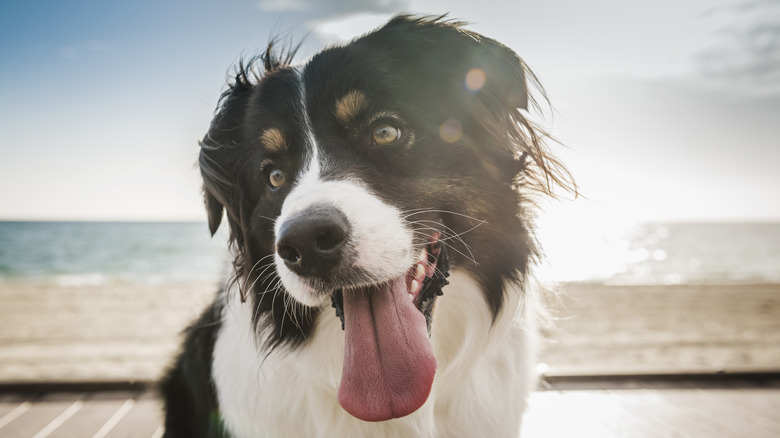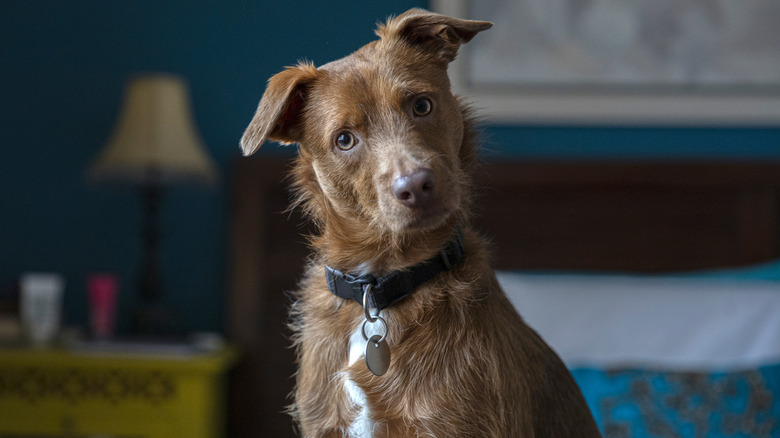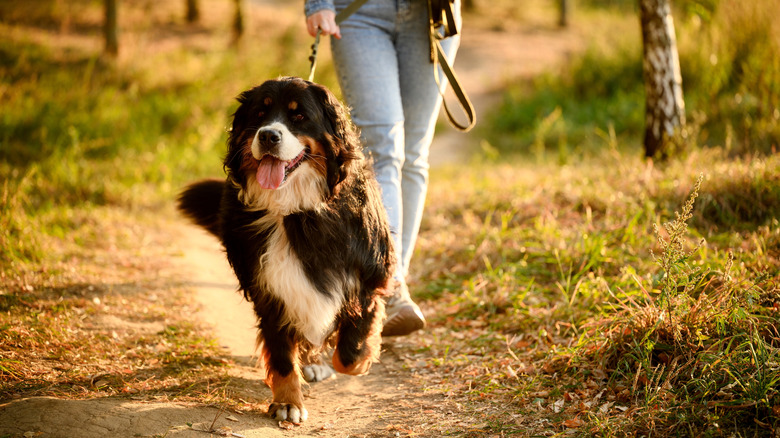Your Dog May Be Able To Tell If Someone Hates You
It's an experience every dog owner has had: You're out at the park playing with your furry companion when a stranger walks by. They haven't done anything, but there's something in the air that puts you on edge. Your dog has picked up on it, too. They might bark or growl, put themselves between you and the stranger, or retreat. Whatever the case, and for whatever reason, they're just not feeling this person. You might want to chalk it up to a case of "bad vibes," but research now suggests that your dog isn't likely reacting to the stranger — they're reacting to you reacting to the stranger.
A 2015 study published in the journal Animal Behaviour found that dogs are more than capable of observing how people treat their owners (and how their owners react) and adjusting their behavior accordingly. In an experiment, researchers from Kyoto University in Japan had dogs observe their owners struggling to open a container. They then observed one of two strangers either help their owner or refuse to help them. Later, when both strangers offered the dog a treat, they consistently avoided the unhelpful person, even when both individuals behaved neutrally toward the dog itself.
This might seem like a small behavioral quirk, but it points to something far more substantial. Dogs aren't just tuned into body language or commands; they're acutely aware of context, forming basic social evaluations and scanning for observational cues to decode who is friend and who is foe. So, it looks like humankind's best friend really does have your back, which is definitely one of the reasons why ancient cultures revered their dogs, too. But how exactly do they do this, and what does it say about the emotional intelligence of our four-legged companions?
How dogs pick up social cues
Researchers at Kyoto University designed an experiment to investigate whether dogs consider social context when deciding whether to trust someone based on how they interact with their owner over a neutral object. They and had their owners attempt to open a clear container containing a roll of vinyl tape. The owners pretended to struggle with the lid while two strangers sat nearby, both of whom were unknown to the dog.
In the "helper" condition, one of the strangers assisted the owner, while in the "non-helper" condition, one of the individuals refused. Researchers also included a "neutral" condition, in which both bystanders sat passively without getting involved. Later, in the neutral condition, one of the bystanders turned away from the owner, with no interaction having taken place between them. After the interaction, both strangers offered food to the dog. The critical question: Would the dog show a preference when offered a treat by individuals from each of the conditions?
As it turns out, they did. Dogs were significantly more likely to accept food from either the helpful or neutral person, and showed a clear avoidance of the unhelpful individual. This suggests that the dogs weren't simply reacting to tone or body language aimed directly at them. Instead, they observed a third-party interaction and made a social judgment about the humans involved. That's a big deal. While past research has shown like pointing or gazing, this study suggests a more complex cognitive ability: tracking behavior between others and using it to guide future choices. It raises the possibility that dogs possess a sense of fairness, a trait usually associated with humans and non-human primates, and it's more evidence to back up dogs' place on the list of 5 animals that are smarter than you think.
A bond thousands of years in the making
The fact that dogs can evaluate how others treat their owners could be an evolutionary outcome of one of the oldest partnerships in human history. Archaeological and genetic evidence suggests that dogs were domesticated sometime between years ago, and possibly even earlier. Unlike livestock, dogs weren't domesticated for food or labor alone. Many researchers believe the relationship began when wolves started scavenging near human camps. The most tolerant and least fearful individuals gradually formed cooperative relationships with humans. Over generations, led to cohabitation and a kind of mutual selection: humans favored dogs that were attentive, obedient, and socially responsive, and that made them especially attuned to human emotions and behavior.
We see the legacy of that bond everywhere today. One 2015 study found that when dogs gaze into their owners' eyes, both parties experience a surge in oxytocin, in bonding between humans. That hormonal feedback loop likely deepened the connection over millennia, reinforcing emotional sensitivity and loyalty.
So, when your dog snubs someone who has been rude to you, it's not just instinct; it's a behavior shaped by tens of thousands of years of evolution. They've been reading and defending us for longer than we've had written language, truly making them the goodest boys and girls. But while dogs are doing great, wolves are having a harder time. Check out our breakdown of the reason you'll only find the rarest species of wolf in North Carolina to learn why.


